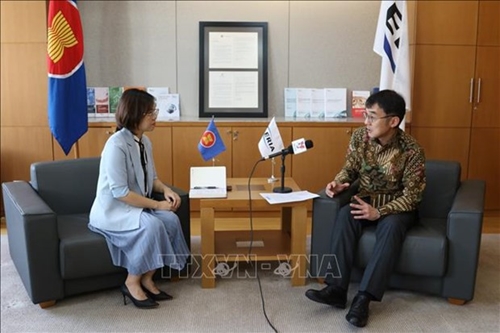In an interview granted to Vietnam News Agency correspondents in Jakarta on threshold of the Commemorative Summit for the 50th Year of ASEAN-Japan Friendship and Cooperation to be held in Tokyo from December 16-18, Watanabe said that the summit not only marks the 50th anniversary of the two sides’ friendship and cooperation but is also a very important opportunity to "renew" their partnership for the next 50 years.
    |
 |
|
President of the Economic Research Institute for ASEAN and East Asia Watanabe Tetsuya (right) in an interview with Vietnam News Agency correspondent in Jakarta |
The leaders will discuss major areas of cooperation such as politics, economics, socio-culture, along with many new projects. However, the researcher said that one of the important topics of the summit is energy transition cooperation, which is very important for both Japan and ASEAN.
In the context that ASEAN and Japan are facing common challenges, including the transition to a more sustainable and carbon-free economy and society, Watanabe thought that the two sides should cooperate extensively in this "front," adding that innovating platforms and supply chains is very important.
According to the ERIA President, ASEAN is a very fast growing economic region, and has many opportunities to promote economic growth, business and investment with a relatively young population structure. Meanwhile, Japan is a mature economy with huge investment capital, many research & development activities, as well as advanced technology in the fields of digital technology, semiconductor, and artificial intelligence (AI). Therefore, the two sides can complement and take advantage of each other's strengths.
Regarding Vietnam's role in ASEAN-Japan cooperation as well as Vietnam's position in Tokyo's "Global South," Watanabe assessed Vietnam as an emerging economy with great importance for other countries around the world. Japan and Vietnam have maintained good friendship for decades, and promoting bilateral cooperation will be beneficial for both countries, for ASEAN and the whole world.
He also listed a series of potential fields of cooperation between Japan and Vietnam, such as energy transition, digital economy, decarbonization, electric vehicles, supply chains, automobiles and electronics.
Especially, for a strongly growing economy like Vietnam, improving public transportation is an important agenda, which offers an opportunity for Japan and Vietnam to cooperate in high-speed trains, subways and inner-city transportation, said the researcher.
He noted that many Japanese companies are currently looking for opportunities in investment and establishing production facilities in Vietnam, and this trend will continue to increase in the near future.
In addition, in the face of current geopolitical tensions and fierce competition between major countries, many companies and investors are adopting more flexible supply chain strategies. In that context, Vietnam is in a very good position and is one of the most attractive alternative investment destinations for global entrepreneurs, he added.
Source: VNA